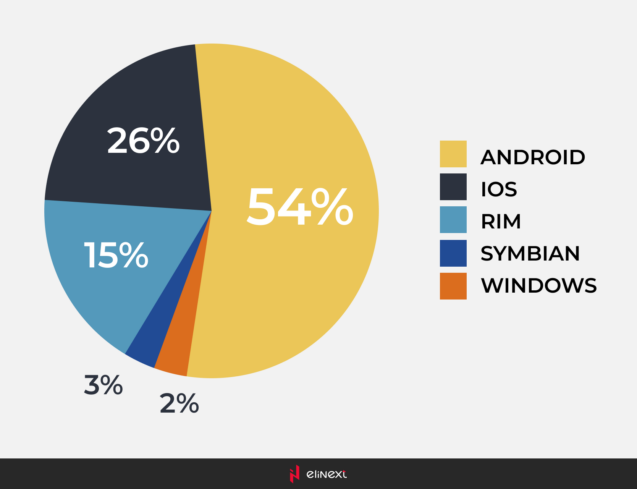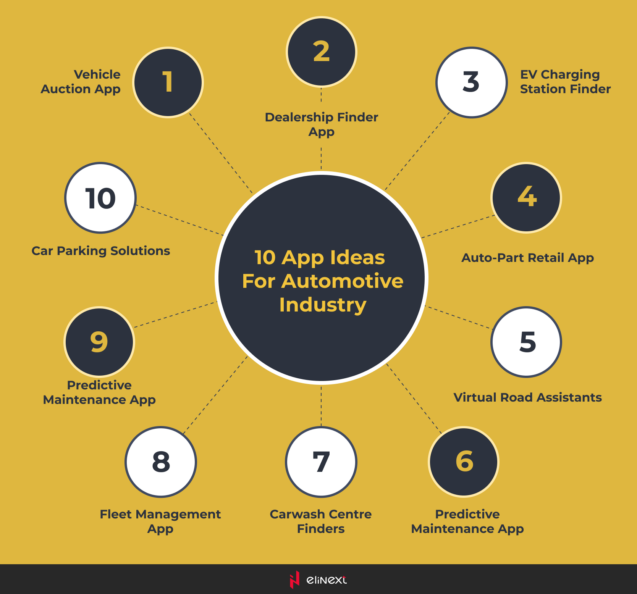The car has become not merely a device for transportation, but a platform for innovative enhancements that enrich the driving experience. Moreover, the availability of advanced IT solutions in automobiles is now playing an increasing role in customers’ purchasing decisions.
Today, in the era of digital communication, native mobile apps serve as a common bridge between manufacturers and customers, breathing fresh air into marketing and management strategies. One must admit that the automotive industry has been quick to embrace this trend. Virtually every megabrand like GM, Ford, Rolls-Royce, Jaguar, BMW, Toyota, Hyundai and others is already on the mobile bandwagon to market their autos.
Whether consumers are collecting information on new model offerings, researching car features and prices, or mapping their way to the nearby dealership, they are accessing content across a variety of smartphones and operating systems:

How Automotive Mobile Apps Are Transforming the Industry
Automotive app development is revolutionizing the industry by enhancing convenience and safety for drivers. An automotive mobile app can offer features such as real-time traffic updates, vehicle maintenance scheduling, and even fuel delivery services. For example, drivers can use apps to order fuel locally, making it easier to refuel. These innovations make driving smarter and more efficient, transforming how users interact with cars and services.
-
Smarter Manufacturing
Automotive mobile app development enables manufacturing to become smarter through real-time data integration and automation. For example, apps can monitor production lines, predict maintenance needs, and optimize workflows, increasing efficiency and reducing downtime in automotive factories.
-
Connected Cars
Automotive mobile apps play a key role in the development of connected cars, allowing users to remotely monitor and control their vehicles. For example, drivers can start the engine, check the fuel level, or locate their car via an app, making everyday travel more convenient and safer.
-
Automotive Supply Chain & Logistics
Automotive app development is transforming supply chains and logistics by enabling real-time inventory tracking and management. For example, apps help manufacturers monitor part deliveries, reducing delays and optimizing production schedules for smoother operations.
-
Car Maintenance & Repairs
Automotive mobile app makes it easier to maintain and repair your vehicle by offering features such as continuous vehicle monitoring and service appointments. For example, apps can notify users of upcoming maintenance or connect them with nearby repair shops, improving the quality of service and efficiency of vehicle maintenance.
10 Types of Automotive Mobile Apps
The automotive software development company creates a variety of mobile applications for cars, including navigation, maintenance, fuel tracking, and connectivity. These applications improve the user experience, safety, and vehicle management, driving innovation in the automotive industry.
-
Vehicle Auction App
Car auction apps allow buyers and sellers to bid on cars in real-time, offering transparent pricing and a wide selection of vehicles to simplify the buying and selling process.
-
Dealership Finder App
Dealer locator apps help users find nearby car dealerships, browse inventory, and schedule visits or test drives, making the car buying experience more convenient.
-
EV Charging Station Finder
EV charging station apps help EV owners find nearby charging stations by showing availability, pricing, and compatibility for easy recharging.
-
Auto-part Retail App
Car parts selling apps allow users to browse, order, and track auto parts online, making repairs and upgrades easier with fast shipping and product information.
-
Virtual Road Assistants
Virtual road assistants provide real-time navigation, hazard alerts, and emergency assistance via mobile apps, enhancing driver safety and convenience on the road.
-
Custom Vehicle Design
Car custom design apps allow users to virtually personalize a vehicle’s features, colors, and accessories, helping buyers visualize and create their ideal vehicle.
-
Car wash Centre Finders
Car wash locator apps locate nearby car washes, display ratings and prices, and allow you to book slots, saving time and ensuring your vehicle is clean.
-
Fleet Management App
Fleet management apps track vehicle locations, monitor driver behavior, and optimize routes, increasing efficiency and reducing operating costs for companies.
-
Predictive Maintenance Applications
Predictive maintenance apps analyze vehicle data to predict problems before they happen, schedule timely repairs, and reduce costly downtime.
-
Car Parking Solutions
Parking apps help drivers find, book and pay for parking spaces in crowded areas, reducing search time and improving urban mobility.

Must-Have Features for Automotive Mobile Apps
Automotive mobile app development in 2025 should include AI-powered diagnostics, voice control, and seamless integration with the Internet of Things. For example, apps can predict problems before they occur and provide hands-free control, improving safety and usability on the road. This trend drives innovation, making advanced functionality a must for competitiveness in the automotive app market.
Applications features
- A searchable owner’s manual;
- Media galleries and showrooms with quick access to datasheets and pricing information;
- Dealer locations;
- Roadside service information;
- Weather and traffic alerts;
- Parking assistance;
- Navigation directions;
- Service reminders;
- Engine tuning;
- Real-time information about battery capacity, fuel tank contents, oil life, and tire pressures;
- Fuel consumption calculator;
- Door lock indicator;
- Climate control system;
- Pollution calculator.
How Elinext’s Automotive Software Development Services Helps the Industry
Elinext Automotive Mobile App Development accelerates digital innovation by creating specialized applications for connected cars, fleet management, and predictive maintenance. For example, the company has created an application that offers real-time vehicle diagnostics and remote control functions, improving safety and efficiency. Elinext’s solutions help automakers and service providers optimize operations, increase user engagement, and remain competitive in the rapidly evolving automotive industry.
What is the Future of the Automotive App Development with Elinext
The future of automotive app development with Elinext is focused on integrating AI, IoT, and the cloud to create smarter, safer vehicles. For example, Elinext develops apps that use AI to predict maintenance needs and IoT to enable seamless communication between the vehicle and the infrastructure. This approach helps automakers improve the user experience, enhance safety, and innovate in the rapidly changing automotive industry.
Conclusion
The automotive industry needs more mobile apps because automotive mobile app development improves the user experience, safety and connectivity of the car. For example, automotive mobile apps offer real-time diagnostics, remote control and intelligent navigation. Forecasts show a growing demand for AI-powered features and IoT integration, making apps indispensable for modern cars, increasing efficiency and customer engagement in the technology-driven market.
FAQ
Why is the automotive industry investing in mobile apps?
The automotive industry is investing in automotive mobile apps to revolutionize the user experience, enable remote vehicle control, streamline workflows and increase efficiency, transforming the way consumers interact with their cars.
How do automotive mobile apps benefit car manufacturers?
Automotive mobile app development benefits automakers by enabling real-time data analysis, improving production efficiency, reducing downtime, and enhancing customer engagement through the intelligent features of connected cars.
Can automotive mobile apps improve vehicle safety?
Yes, automotive mobile apps improve vehicle safety by enabling communication between vehicles and road infrastructure, offering features such as real-time alerts, driver assistance and accident prevention, making vehicles smarter and safer.
How are automakers responding to Tesla’s lead in software and apps?
Automakers are responding to Tesla’s leadership by investing heavily in automotive mobile app development, focusing on over-the-air updates, in-house software development teams, and partnerships with tech companies to catch up on software integration and user experience.
Will automotive apps replace traditional key fobs or dashboards?
Increasingly, automotive mobile apps are replacing traditional key fobs, offering digital keys that allow users to unlock and start their cars using their smartphones, increasing convenience and security, as seen with Tesla and other brands.









